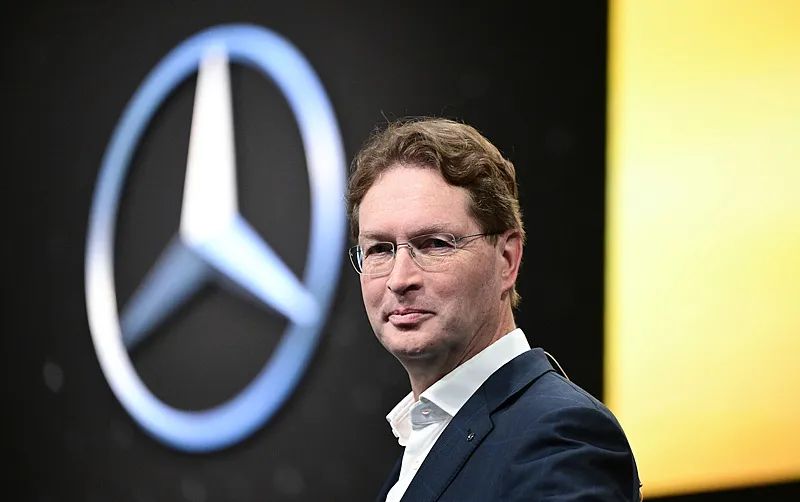Mercedes-Benz Aims to Slash Over a Hundred Domestic Dealers, Marking the End of 13 Years of Uninterrupted Channel Expansion
![]() 05/13 2025
05/13 2025
![]() 686
686

In anticipation of challenges before 2027, Mercedes-Benz continues to actively streamline its operations.
By Cao Lin
Edited by Mao Shiyang
Original content by AutoPix (ID: autopix)
01.
Mercedes-Benz Contraction
AutoPix has exclusively learned that Mercedes-Benz intends to adjust the size of its domestic dealer network, aiming to reduce over a hundred dealers, with most of these reductions expected to be completed by 2025.
Mercedes-Benz's sales peak in China occurred in 2023, with annual sales exceeding 765,000 units. It was around this time that the number of Mercedes-Benz dealers in China surpassed 700.
Challenges emerged last year as Mercedes-Benz had to sustain significant market promotions amidst declining sales, eventually resulting in annual sales dropping to 714,000 units. In the first quarter of this year, Mercedes-Benz's sales in China stood at 152,800 units, continuing a year-on-year decline of approximately 10%.
During periods of sales growth, automakers strive to expand their networks to enhance service coverage and preempt opportunistic markets ahead of competitors. However, when sales decline, an excessive number of dealers can become a burden.
Earlier this year, Zhang Yan, Senior Executive Vice President of Beijing Mercedes-Benz Sales Service Co., Ltd., revealed that "based on the business consensus of 'improving operational efficiency,' we and dealer investors have jointly decided to strategically and proactively implement network optimization from 2025 onwards." This year and next, Mercedes-Benz will continue to advance the optimization and consolidation of low-efficiency dealer outlets.
A source close to Beijing Benz informed us that with an abundance of dealerships, it is challenging for Mercedes-Benz to curb price wars among dealers, leading to low-price competition among some dealers.
The goal of reducing the number of dealers is not only to control prices but also to reduce costs. As the dealer network shrinks, there is scope for personnel reduction within Mercedes-Benz's support system. At the end of February this year, Mercedes-Benz China completed its first round of layoffs, with a layoff ratio of about 15%, heavily impacting the sales system.
On April 30th of this year, Mercedes-Benz announced its first-quarter results for 2025. Among the key financial indicators, revenue was 33.2 billion euros, a decrease of approximately 2.7 billion euros from the same period last year; net profit was 1.731 billion euros, compared to 3.025 billion euros in the same period last year.
To enhance financial performance, Mercedes-Benz continues to push for cost reduction. During the financial report meeting at the end of last year, Mercedes-Benz executives revealed that cost reduction measures would encompass all types of costs and would be implemented across Mercedes-Benz's businesses in various countries and regions. Earlier this year, Ola Kaellenius, Chairman of the Board of Management of Mercedes-Benz, revealed that continuous measures would be taken over the next two years, with the aim of making the "company faster, leaner, and stronger."
Currently, Mercedes-Benz's contraction is expected to continue at least until 2027.
02.
Adjustments Will Continue
Among the three German luxury automotive brands, BBA, Mercedes-Benz China's localization strategy did not commence early. In 2012, Mercedes-Benz sold 196,000 units in China, less than half of Audi's sales, and at that time, there were fewer than 50 Mercedes-Benz dealers in China. To boost sales, the following year, Mercedes-Benz established nearly 75 new dealers simultaneously, and from that year onwards, Mercedes-Benz experienced over a decade of golden sales growth. In 2019, it surpassed 700,000 units for the first time, on par with Audi.
Mercedes-Benz's sales growth has long been reliant on the expansion of its dealer network. At its peak, Mercedes-Benz's annual sales in China nearly quadrupled from 2012, and the number of dealers nearly quadrupled.
According to data released by the China Automobile Dealers Association, around 4,000 dealers withdrew from the market in China throughout 2024. However, a senior practitioner in the automobile circulation field told us that despite automobile dealers, including Mercedes-Benz, incurring losses over the past two years, Mercedes-Benz remains a quality asset among them. Many dealer investors may not be willing to exit even if they incur short-term losses.
Furthermore, the hardware investment standard for Mercedes-Benz 4S stores is top-notch in the industry, with investment in a single store in a second-tier city exceeding 20 million yuan, and investment in a first-tier city being two to three times that amount. Mercedes-Benz's plan to reduce dealers will hinge on reasonable compensation.
Zhang Yan once revealed that in 2024, Mercedes-Benz optimized dealer standards, resulting in a decrease of over 25% in the investment cost for dealers to build and upgrade stores.

▍Mercedes-Benz All-New CLA
Mercedes-Benz will launch the all-new CLA this year, marking the inception of the next generation of electric vehicles, with other products gradually completing their layout in the coming years.
However, it will take several years for new products to turn the tide. Currently, facing challenges from domestic new-energy vehicle companies such as Li Auto and NIO, Mercedes-Benz hopes to simultaneously make changes in its system capabilities to stabilize its position post-2027.
As part of the transformation in system capabilities, Mercedes-Benz has significantly reduced the size of its domestic sales system, aiming to improve efficiency and streamline the team. Simultaneously, however, its domestic R&D system is expanding.
Previously, the R&D team of Mercedes-Benz China played an auxiliary role. Although the team size exceeded 2,000 people, most of them were involved in local adaptation development of Mercedes-Benz models. Sources close to Mercedes-Benz informed us that many of Mercedes-Benz's R&D projects are now shifting to China, with a focus on software, particularly undertaking the development work of Mercedes-Benz's self-developed intelligent cockpit system MB.OS, rather than vehicle development.
Before Mercedes-Benz achieves its transformation goals and stabilizes its performance, reductions and adjustments in businesses such as sales channels are likely to persist for some time.
This article is original content by AutoPix (autopix). Unauthorized reproduction is prohibited.





